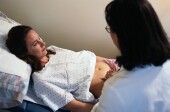
THURSDAY, Feb. 16 (HealthDay News) — An alarming increase in ectopic pregnancy-related deaths among Florida women is likely caused by illicit drug use and delays in seeking medical care, a U.S. report released Thursday says.
The finding that deaths from ectopic pregnancies jumped fourfold in the past decade in Florida points to a need for improved access to health care and greater awareness of the importance of early pregnancy testing, officials from the U.S. Centers for Disease Control and Prevention said in a report published in the Feb. 17 issue of the agency’s Morbidity and Mortality Weekly Report.
“This is the first report of an abrupt increase in ectopic pregnancy deaths identified in the United States in recent times,” the CDC researchers said in the report.
Ectopic pregnancy is a life-threatening condition that occurs when an egg is fertilized outside of the uterus, usually in the fallopian tube. If undetected, the mother-to-be may die from hemorrhage due to tubal rupture.
From 1999 to 2008, Florida’s death rate from ectopic pregnancy was similar to the national rate — 0.6 deaths per 100,000 live births — but it has jumped dramatically in recent years to 2.5 per 100,000 births in 2009-2010. While 13 ectopic-related deaths were reported in Florida in the decade 1999 to 2008, nearly that number — 11 — were reported in just 2009-2010, the agency said. During that time, the proportion of deaths caused by ectopic pregnancies soared from 3.5 percent of all pregnancy-related deaths to 10.8 percent, the report noted.
Compared to the earlier period, the women who died from tubal pregnancy in 2009-2010 were more likely to be single, white or Hispanic, lack health insurance and have less than a high school education, the report found.
Officials said the women who died during 2009-2010 were more likely to have collapsed from hemorrhage before seeing a health care provider than the women who died during 1999-2008. And several women tested positive for illicit drug use, including cocaine.
One expert said the study is important. “It underscores the need to alert women and educate them concerning the signs, symptoms and care of ectopic pregnancy,” said Dr. Elizabeth Poynor, a gynecologic oncologist and pelvic surgeon at Lenox Hill Hospital in New York City.
Nationwide, between 1 percent and 2 percent of pregnancies are ectopic, but these abnormal pregnancies account for between 3 percent and 4 percent of pregnancy-related deaths. However, the death rate from ectopic pregnancies steadily declined nationally in the late 20th century through 2007, the latest year for which figures are available.
The study has several limitations, the researchers stressed. Full medical information was not available for the deceased women, and drug testing was not routine during much of the earlier period.
Efforts to educate women on the dangers of drug use before and during pregnancy are essential, the CDC researchers added.
More information
There’s more on ectopic pregnancy at the U.S. National Library of Medicine.

